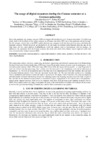Please use this identifier to cite or link to this item:
https://accedacris.ulpgc.es/jspui/handle/10553/76555
| DC Field | Value | Language |
|---|---|---|
| dc.contributor.author | Steinert, Christian | en_US |
| dc.contributor.author | Kutzner, Tobias | en_US |
| dc.date.accessioned | 2020-12-11T13:16:46Z | - |
| dc.date.available | 2020-12-11T13:16:46Z | - |
| dc.date.issued | 2020 | en_US |
| dc.identifier.isbn | 978-84-09-22254-4 | en_US |
| dc.identifier.uri | https://accedacris.ulpgc.es/handle/10553/76555 | - |
| dc.description.abstract | The engineering students (electrical engineering, mechanical engineering and industrial engineering) at the Brandenburg Technical University Cottbus-Senftenberg (BTU) have been offered study-related, electronic tests in mathematics (in the first and second semester with 6 SWS each) since 2014. Since 2016, the successful (successful = at least 50 percent of each test solved correctly) processing these weekly tests has been part of the compulsory examination admission in mathematics [1]. The tests are designed in such a way that, due to the randomization of the task variables, they can lead to increased learning success even if they are processed several times [2]. The tests and other activities (e.g. learning videos, simulations and interactive materials such as memories) in the digital course room have also been accompanied and additionally evaluated with the help of tools for collecting learner data (learning analytics) since 2016 [3]. As part of this contribution, the student activities (which is understood as digital engagement in this context) due to the pandemicrelated online summer semester 2020 are to be compared with those from previous years (summer semester 2014 to 2019). These student cohorts are largely comparable in terms of the total number of students who took part in the course, as well as their previous knowledge of mathematics and the final examination (exam grades). | en_US |
| dc.language | eng | en_US |
| dc.source | VII Jornadas Iberoamericanas de Innovación Educativa en el Ámbito de las TIC y las TAC, Las Palmas de Gran Canaria, 19 y 20 de noviembre de 2020, p. 335-340 | en_US |
| dc.subject | 58 Pedagogía | en_US |
| dc.subject | 530602 Innovación tecnológica | en_US |
| dc.subject.other | e-assessment | en_US |
| dc.subject.other | Learning analytics | en_US |
| dc.subject.other | Digital match education | en_US |
| dc.subject.other | Online course | en_US |
| dc.subject.other | Pandemic | en_US |
| dc.subject.other | German university | en_US |
| dc.subject.other | Live video | en_US |
| dc.subject.other | BigBlueButton | en_US |
| dc.title | The usage of digital resources during the Corona semester at a German university | en_US |
| dc.type | info:eu-repo/semantics/conferenceobject | en_US |
| dc.type | ConferenceObject | en_US |
| dc.relation.conference | VII Jornadas Iberoamericanas de Innovación Educativa en el Ámbito de las TIC y las TAC (InnoEducaTIC 2020) | en_US |
| dc.description.lastpage | 340 | en_US |
| dc.description.firstpage | 335 | en_US |
| dc.investigacion | Artes y Humanidades | en_US |
| dc.type2 | Actas de congresos | en_US |
| dc.utils.revision | Sí | en_US |
| dc.identifier.ulpgc | Sí | en_US |
| item.grantfulltext | open | - |
| item.fulltext | Con texto completo | - |
| crisitem.event.eventsstartdate | 19-11-2020 | - |
| crisitem.event.eventsenddate | 20-11-2020 | - |
| Appears in Collections: | Actas de congresos | |
Page view(s) 10
380
checked on Jan 16, 2026
Download(s)
145
checked on Jan 16, 2026
Google ScholarTM
Check
Altmetric
Share
Export metadata
Items in accedaCRIS are protected by copyright, with all rights reserved, unless otherwise indicated.
